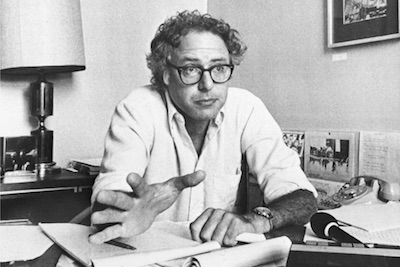
Bernie Sanders wrote to Margaret Thatcher in 1981 in a bid to put a stop to the “abuse, humiliation and degrading treatment” of Irish republican political prisoners who were on hunger strike, documents show.
The US presidential hopeful told the former prime minister he was disturbed by the British government’s stance on the hunger strikes.
“We are deeply disturbed by your government’s unwillingness to stop the abuse, humiliation and degrading treatment of the Irish prisoners now on hunger strikes in Northern Ireland, “ wrote the politician, who was mayor of Burlington, Vermont, at the time.
The document was published on Thursday by the London Telegraph and is part of an archive held at the University of Vermont.
Writing two months after the death of Bobby Sands, Mr Sanders said the treatment of the prisoners was damaging England’s international reputation.
“We ask you to end your intransigent policy towards the prisoners before the reputation of the English people for fair play and simple decency is further damaged in the eyes of the people of Vermont and the US,” he said.
The papers also reveal the strong support the Irish struggle had in the city during the 1980s, a time when the conflict was at its height.
Only two days before the letter was sent, Burlington aldermen were addressed by Fergus O’Hare, a civil rights activist on Belfast Council.
His address, on the condition of the republican prisoners in H-Block, was deemed to be unofficial because of the opposition of some Burlington aldermen. Mr Sanders, however, was quoted in the local press, saying: “I am delighted to have a member of the Belfast City Council coming here”.
According to contemporary newspaper reports, another prominent supporter of Mr O’Hare’s right to address Burlington’s aldermen in official session was Jane O’Meara Driscoll - the future Mrs Sanders.
The Vermont files show that Mr Sanders was interested in the heavily criticised “supergrass trials”, which saw a number of republicans convicted on the word of paid informers.
In November 1983, in a letter sent “to whom it may concern”, Mr Sanders urged that the case of another hunger striker, Nicky Kelly, who was convicted of armed robbery in Dublin, be reopened. Mr Kelly was released the following year and pardoned in 1992.
Vermont has always had a proud history of standing against British abuses in Ireland, notably in the establishment of the Vermont Committee for Irish Human Rights.
Mr Sanders was on their mailing list, which publicised a number of events in Burlington. They included a May 1983 press conference at Burlington City Hall, given by Desmond Wilson, a priest from west Belfast.
According to the publicity accompanying the event, Father Wilson was “emphatic in his belief that the Irish conflict is best understood as one between a local population and an undemocratic foreign power.”
In 1986 Bernadette (Devlin) McAliskey, who at one point was banned from the US, addressed a meeting at a municipal auditorium in Burlington.
![[Irish Republican News]](https://republican-news.org/graphics/title_gifs/rn.gif)
![[Irish Republican News]](https://republican-news.org/graphics/title_gifs/harp.gif)

